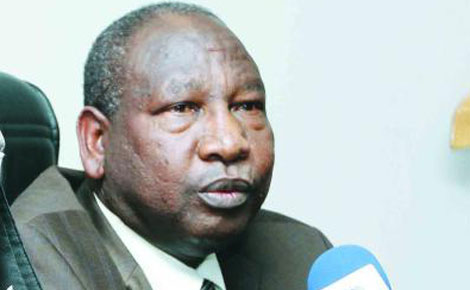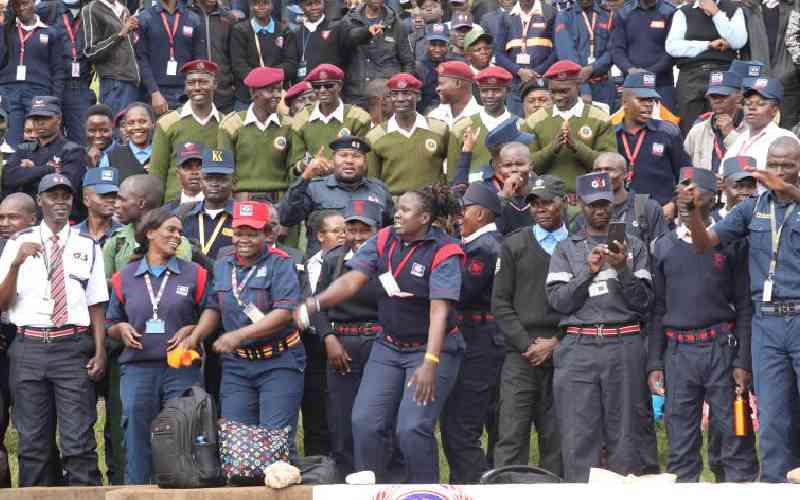 |
|
Teachers Service Commission Secretary General Gabriel Lengoiboni. |
The teachers’ employer gave a blow-by-blow account of pay talks, as it emerged unions had lowered their expectations on salary increments.
Teachers Service Commission (TSC) sought to set the record straight on the controversial new pay negotiations that resume next week even as one of the unions vowed to boycott the talks, accusing the Government of delays.
The Kenya National Union of Teachers (Knut) and Kenya Union of Post Primary Education Teachers (Kuppet) reportedly scaled back their salary increment demand from 300 per cent to between 100 and 150 per cent.
But Kuppet vowed not to attend further talks and has since recorded a dispute case with the Labour ministry, setting in motion plans to call its members to strike.
The Government maintains that negotiations are still under way, with the teachers’ employer postponing the talks to October 24.
Documents from TSC indicate that Knut and Kuppet also wanted commuter allowance for teachers harmonised with those of civil servants.
Knut had demanded the allowance paid at the rate of 10 per cent of teachers’ basic pay.
This scaling down of the unions’ demands regarding commuter allowance means the Government might not consider it as part of issues under dispute as TSC said the allowance stands harmonised with civil servants rates.
Time wasted
The unions also went down on their push for responsibility allowance by some five-percentage points. They now want secondary and primary school heads to be paid 35 per cent of their basic pay from the initial 40 per cent.
Deputy head teachers should also be paid 35 per cent, according to Kuppet and Knut.
Unions wanted heads of departments and senior teachers to be paid 25 per cent of their basic pay as responsibility allowance. They had proposed 30 per cent initially.
Knut and Kuppet have also dropped their demand to have teachers paid half their basic pay as special school allowance.
They now want a flat rate of Sh20,000 paid to all teachers. The unions also agreed that all eligible teachers be paid hardship allowance at 30 per cent of their basic salary. This is the current payment rate according to the Legal Notice of 1997.
But the unions are split over the Government’s handling of the talks, with Kuppet Secretary General Akelo Misori terming the discussions scheduled for next week “a waste of time”.
Stay informed. Subscribe to our newsletter
Mr Misori said they have had five meetings with TSC with “nothing to show for the time wasted in the employers' boardroom”.
“The 10-day request by the TSC is a recipe for buying time and creating anxiety among teachers. The Government has been listening and if it is serious, it should have made a proactive proposal,” said Misori.
However, Knut Secretary General Wilson Sossion said they would go ahead with all planned meetings as the Government requested.
“We shall allow the Government time to table an offer. This is a negotiation and if the Government asks for time to consult we must allow them,” said Mr Sossion.
TSC Secretary Gabriel Lengoiboni yesterday assured all KCSE and KCPE examinations candidates that the tests would continue as scheduled.
He said teachers would be available in schools to administer the exams and asked them to prepare adequately.
Meanwhile, on other demands, the unions maintained that house allowances be revised at a rate of 50 per cent of their basic pay.
The unions also insisted that teachers be paid an amount equivalent to one month’s salary as leave allowance.
The allowance is currently not harmonised with that of civil servants, but TSC said this component must wait until a comprehensive study by the Government was complete.
The Salaries and Remuneration Commission (SRC) is conducting a survey on allowances paid to public servants and noted that the findings would inform a policy framework on allowance payments.
“As a result of this, there is need for exhaustive and comprehensive consultations with relevant Government agencies such as SRC and the National Assembly,” said Mr Lengoiboni.
The Government has, however, not committed to many other demands presented by teachers’ unions. Township allowance, adult education teachers allowance, youth polytechnic lecturers allowance and sabbatical leave demands have received no specific response from the Government.
Special loans
TSC also said Government policy on the voluntary retirement age stands. The unions wanted it pegged at 45 years, with the compulsory retirement age as 60 years.
Danger or hazard allowance demanded by teachers would also have to wait for the SRC study on allowances.
Teachers have also been advised to seek loans from financial institutions. Unions wanted special loans given at affordable rates.
The current rates for mileage claims would remain the same even as teachers’ unions pushed for higher rates. This response also applied to teachers’ demands for advance payments to purchase vehicles.
They wanted this to range between Sh360,000 and Sh1.8 million.
 The Standard Group Plc is a
multi-media organization with investments in media platforms spanning newspaper
print operations, television, radio broadcasting, digital and online services. The
Standard Group is recognized as a leading multi-media house in Kenya with a key
influence in matters of national and international interest.
The Standard Group Plc is a
multi-media organization with investments in media platforms spanning newspaper
print operations, television, radio broadcasting, digital and online services. The
Standard Group is recognized as a leading multi-media house in Kenya with a key
influence in matters of national and international interest.
 The Standard Group Plc is a
multi-media organization with investments in media platforms spanning newspaper
print operations, television, radio broadcasting, digital and online services. The
Standard Group is recognized as a leading multi-media house in Kenya with a key
influence in matters of national and international interest.
The Standard Group Plc is a
multi-media organization with investments in media platforms spanning newspaper
print operations, television, radio broadcasting, digital and online services. The
Standard Group is recognized as a leading multi-media house in Kenya with a key
influence in matters of national and international interest.









